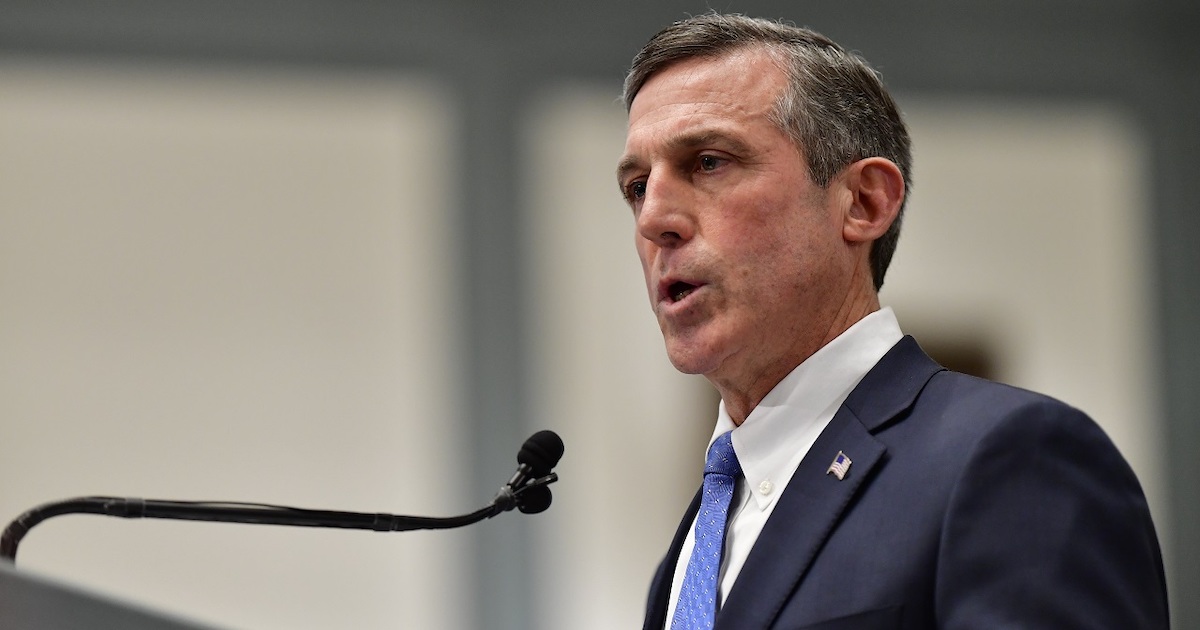Key actions and positions posted on the intersection of disability and education, jobs, immigration, climate crisis, criminal justice and more

Wilmington, DE, Sept. 9 – Incumbent Democratic Governor John Carney has responded to a detailed candidate questionnaire on disability issues. The questionnaire is from RespectAbility, a nonpartisan nonprofit disability organization that does not endorse candidates. The questionnaire is purely for educational purposes. RespectAbility has reached out to key Senate and gubernatorial campaigns on both sides of the aisle and will be posting all responses on The RespectAbility Report. The full text of RespectAbility’s questions and Carney’s responses follows:
1. Learning during the COVID-19 pandemic has led to more issues and concerns for all students and their families, but this is especially true for students with disabilities. Additionally, the gap in graduation and drop-out rates between students with and without disabilities continues to undermine their futures. For example, in the class of 2018, only 66 percent of Black students with disabilities, 71 percent of Hispanic students with disabilities, 77 percent of white students with disabilities, and 79 percent of Asian-American students with disabilities completed high school. Furthermore, just seven percent of students born with a disability graduate from college. What is your plan for ensuring that all students with disabilities receive a quality and appropriate education to acquire the critical and marketable skills necessary to compete in a job-driven economy?
I believe education is the most difficult issue we have faced throughout this crisis. Because despite COVID-19, all Delaware children deserve access to a high-quality education. We have focused on helping school leaders navigate the difficult challenges of returning to school safely during a pandemic. Our top priority is the safety of all of Delaware students, educators and staff. The bottom line is: we cannot get students and educators back in school if we can’t do so safely. We have assigned public health liaisons to Delaware schools and provided comprehensive, data-driven guidance to school leaders. We will continue to support students, educators, and school leaders to make sure we get this right, and to make sure all students have the resources they need to succeed.
2. In the economic expansion prior to the COVID-19 pandemic, the national employment rate for working-age people with disabilities in America was 37.6 percent compared to 77.8 percent of people without disabilities. Further, there continues to be significant disparities in employment outcomes within the disability community, which varies from state to state. There are significant racial disparities in disability employment outcomes. 38.9 percent of working-age white people with disabilities have jobs compared to only 29.7 percent of working-age Black people with disabilities had jobs, 39.4 percent of working-age Hispanics with disabilities and 43.2 percent of working-age Asian-Americans with disabilities. The pandemic has ravaged the disability community and more than 1 million workers with disabilities have lost their jobs. If elected, what will you do to ensure that the government is removing barriers and promoting high quality, inclusive services built on evidence-based policies, practices and procedures leading to competitive, meaningful careers, which includes promoting entrepreneurial opportunities?
This COVID-19 pandemic has devastated the economy and jobs in Delaware and across our country – and this crisis has presented unique challenges for Delawareans with disabilities. But the single best way to get all Delawareans back to work, and get our children back in school, is to seriously confront the threat of COVID-19. We cannot have a healthy economy without healthy communities. We also owe our support to Delaware families who have lost jobs and income, and to Delaware small businesses who have made real sacrifices throughout this crisis. We recently announced a $100 million grant program – DE Relief – to provide real assistance to keep Delaware small businesses afloat during this challenging time. This program has funding specifically for entrepreneurs starting a business or existing small business owners looking to change their business model to be responsive to the COVID-19 pandemic.
3. The disability community fundamentally believes in the need to ensure “Nothing about us, without us” – real inclusion and places at decision making tables – because we know solutions that work and want to be a part of making our communities stronger. What specific measures have you taken to make your campaign accessible for, and inclusive of, people with disabilities, as every issue impacts our lives?
My campaign welcomes all Delawareans to share their thoughts and concerns about the future of our state. We ensure that our offices and community events are always accessible for anyone who wishes to participate in the election process. I have spent most of the past several months talking directly to Delawareans about the threat of COVID-19. We have an obligation to ensure that all Delawareans have access to government services – including the most up-to-date public health information. That’s why we have made sure to include ASL interpreting services for each briefing, for example. We should make it easier – not harder – for all Delawareans to access their state government.
4. RespectAbility published Disability in Philanthropy & Nonprofits, based on our study on the levels of disability inclusion in the social sector across the country. This largescale study found significant data showing that nationwide, organizations overall want to be inclusive, but are unintentionally excluding the one-in-five people with disabilities. What will you do to promote policies and practices designed to support full community engagement, access and inclusion of people with disabilities?
Yes. I believe that a true measure of the commitment of government to the people it serves is how well it addresses the needs of those who are living with disabilities. Throughout my career in public service, I have been a strong advocate for improving the services and support offered to Delawareans with disabilities. I created the Opportunity Funding program, the state’s first weighted funding program, to provide additional support for low-income and underserved students. Through the legislative and budget process, I also supported the McNesby Act, prioritizing additional funding for providers that support people with disabilities and their families. We have more work to do on this issue, but we have made progress.
5. Elected officials have multiple opportunities to demonstrate a strong commitment to diversity and inclusion, full community participation and celebrating the contributions and accomplishments of people with disabilities through press releases, speeches, celebratory events including National Disability Employment Awareness Month. There are significant stigmas that create attitudinal barriers that limit options and perpetuates low expectations for people with disabilities. What measures will you take to combat these stigmas and promote opportunities for people with disabilities?
One of the best parts of my job is celebrating the great work happening up and down our state – and shining a spotlight on the Delawareans and community organizations who are leading that work. We can raise awareness with simple proclamation signings or tribute events. Most years, we hold events for Down Syndrome awareness and Autism awareness at Legislative Hall in Dover, for example. Unfortunately, the COVID-19 pandemic has canceled most of our in-person events. We should look for opportunities virtually to raise awareness of important work happening across Delaware, and new ways to get involved.
6. In our nation’s public schools, there are 6.3 million students with disabilities. The changing demographics of America are reflected in these students, with 11.4 percent of students with disabilities nationwide, almost 720,000, also identified as English-language learners. Their accommodation needs are compounded by the fact that many come from households that do not speak English at home, adding an extra challenge for parental interaction. It can also be harder to diagnose disabilities in children when they are English language learners. Additionally, immigration issues and fears over the public charge rule impact students with disabilities, their families and the wider workforce. What policies would you advance to enable students and their families who are English language learners with disabilities to succeed in school and employment?
As mentioned above, I worked with members of the General Assembly to create the state’s first weighted funding program to allocate additional resources to underserved students. The program provides $75 million over three years to meet the needs of English language learners, students from low income communities, and those dealing with mental health challenges. I plan to continue and build upon this support if re-elected.
7. Housing, criminal justice, climate issues, transportation and every other area have significant impacts on people with disabilities. What additional policies and priorities, other than those already discussed above, do you plan to focus on to improve the lives of people with disabilities?
All of these issues present critical and unique challenges for people with disabilities. I’ve learned about each of them first hand during my years in public service, and through helping my sister and brother in law care for my niece who has severe autism. Whether it’s increasing affordable housing options, improving the transition of offenders back into society, or other ways of assisting those with disabilities live independently in their communities, my administration will continue to look for ways to make progress.
On September 15, the Republican Party of Delaware will be hosting their primary to decide who they will be running against Gov. Carney in November. Once their candidate is chosen, RespectAbility’s team will communicate with them about completing our non-partisan questionnaire.
RespectAbility is a nonprofit, nonpartisan organization that fights stigmas and advances opportunities so people with disabilities can fully participate in all aspects of their communities. RespectAbility does not rate or endorse candidates. View more coverage of 2020 candidates.

[…] John Carney – D – Delaware […]
[…] Read Response in Full […]
[…] Carney completed the 2020 Disability Voter Questionnaire for Presidential, Senate and Gubernatorial candidates put out by the national disability […]
[…] as Governor of North Carolina, beating Republican challenger Dan Forest. Democratic incumbent John Carney has won a second term as Delaware’s Governor, beating Republican challenger Julianne Murray. […]